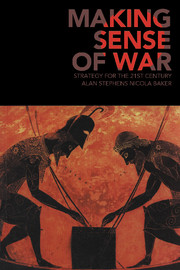Book contents
- Frontmatter
- Contents
- Abbreviations
- Preface
- Introduction
- Chapter 1 How to win
- Chapter 2 Stove-piped strategy
- Chapter 3 Traditional warfighting concepts and practices
- Chapter 4 Manoeuvre and the application of force
- Chapter 5 Shaping the strategic environment
- Chapter 6 Strategic paralysis
- Chapter 7 Contemplating war
- Chapter 8 Constraints on war
- Chapter 9 Controlling war
- Chapter 10 Peacemaking
- Chapter 11 War in the twenty-first century
- Notes
- Select bibliography
- Index
Chapter 10 - Peacemaking
Intervening to protect and repair
Published online by Cambridge University Press: 05 June 2012
- Frontmatter
- Contents
- Abbreviations
- Preface
- Introduction
- Chapter 1 How to win
- Chapter 2 Stove-piped strategy
- Chapter 3 Traditional warfighting concepts and practices
- Chapter 4 Manoeuvre and the application of force
- Chapter 5 Shaping the strategic environment
- Chapter 6 Strategic paralysis
- Chapter 7 Contemplating war
- Chapter 8 Constraints on war
- Chapter 9 Controlling war
- Chapter 10 Peacemaking
- Chapter 11 War in the twenty-first century
- Notes
- Select bibliography
- Index
Summary
CARE AND CAUTION MIGHT make eminent good sense when formulating strategies for international conflicts but there is an increasingly common category of force employment where a rapid response appears critical. This is in the event of a humanitarian disaster. At the end of the Cold War the thawing of the strategic landscape seemed to presage a wave of state collapses, civil wars, and humanitarian crises, a phenomenon that coincided with a revival of enthusiasm for peacekeeping and collective security. Neither of these trends was to maintain its momentum into the twenty-first century, but military intervention and stabilisation of post-conflict environments remain the most likely tasks that most armed forces will be called on to undertake. Recent experience suggests that these missions will pose a range of serious challenges.
Civil wars can be defined as sustained internal conflicts involving large sections of the population and causing a significant number of deaths. They are not new phenomena, having troubled political communities for millennia and many states since the formation of the state system. Essentially they are armed disputes about the distribution of power within political societies, occurring when communities or élites disagree over the nature, structure or extent of political authority or over the polity's allocation of resources, and fail to resolve their disagreements through peaceful means. Civil wars have been fought over the legitimacy of particular rulers, over the governing principles of political organisations, and over community rights.
- Type
- Chapter
- Information
- Making Sense of WarStrategy for the 21st Century, pp. 237 - 258Publisher: Cambridge University PressPrint publication year: 2006



